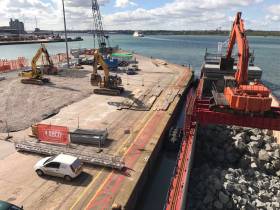Displaying items by tag: Coastal Defences Project
#PortProject - A Northern Ireland based marine civil engineering firm, ABCO Marine have been contracted to work on a project located in Portsmouth.
The contract to the Lisburn firm is from Galliford Try for the construction of Fort Cumberland SST Sea Defences. The project involves replacing damaged sea defences next to the historical Fort Cumberland site in Eastney, Portsmouth.
Southern Water are taking the steps, to protect Fort Cumberland and three of their underground storm tanks, which are vital in helping to prevent flooding in the city of Portsmouth. The storm tanks and combined sewer outfall are an essential part of the catchment – and help to protect the city from sewer flooding during heavy rainfall.
ABCO sourced and procured the rock for the project, with vessels chartered to transport the rock armour from Norway for offloading within Southampton Port where the rock is temporary stockpiled. The rock is then loaded onto cargo barges for marine tow and landing on Fort Cumberland beach, with the barges safely landed on a high tide operation. At low tide, the rock armour is unloaded and stockpiled on the beach in advance of the final rock revetment construction.
Last month ABCO began to mobilise the site which is programmed to be completed and handover in September 2017. Commenting on the contract, John Osborne, ABCO Marine Ltd Director, commented, "The Fort Cumberland Sea Defence project has taken months of planning and communications with both stakeholders and suppliers, all brought together to support the construction phase of the sea defence at Fort Cumberland.
Southampton Port and with special assistance by Langstone Harbour for pilotage have supported ABCO for the beach landing of the rock cargo barges. We are currently mobilising the final plant items to support the rock revetment construction phase, which we hope to have completed to programme. ABCO are delighted to be associated with Galliford Try and Southern Water to deliver the sea defence works".






























































